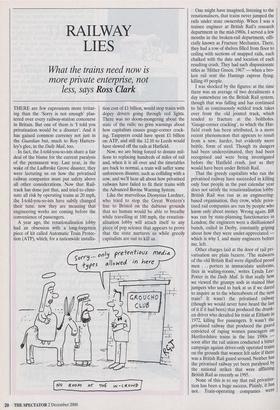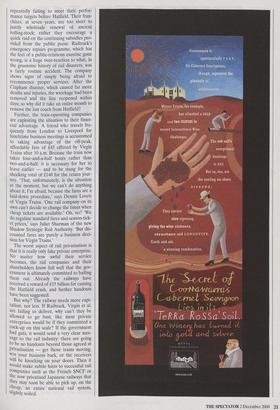RAILWAY LIES
What the trains need now is more private enterprise, not
less, says Ross Clark THERE are few expressions more irritat- ing than the 'Sorry is not enough' plas- tered over every railway-station concourse in Britain. But one of them is 'I told you privatisation would be a disaster'. And it has gained common currency not just in the Guardian but, much to Roy Hatters- ley's glee, in the Daily Mail, too.
In fact, the I-told-you-so-ists share a fair deal of the blame for the current paralysis of the permanent way. Last year, in the wake of the Ladbroke Grove disaster, they were lecturing us on how the privatised railway companies must put safety above all other considerations. Now that Rail- track has done just that, and tried to elimi- nate all risk by operating trains at 20 mph, the I-told-you-so-ists have subtly changed their tune: now they are moaning that engineering works are coming before the convenience of passengers.
A year ago, the renationalisation lobby had an obsession with a long-forgotten piece of kit called Automatic Train Protec- tion (ATP), which, for a nationwide installa- tion cost of £1 billion, would stop trains with dopey drivers going through red lights. There was no doom-mongering about the state of the rails; no grim warnings about how capitalism causes gauge-corner crack- ing. Taxpayers could have spent £1 billion on ATP, and still the 12.10 to Leeds would have slewed off the rails at Hatfield.
Now, we are being forced to donate mil- lions to replacing hundreds of miles of rail and, when it is all over and the timetables are back to normal, a train will suffer some unforeseen disaster, such as colliding with a cow, and we'll hear all about how privatised railways have failed to fit their trains with the Advanced Bovine Warning System.
Like the marvellous Dionysius Lardner, who tried to stop the Great Western's line to Bristol on the dubious grounds that no human would be able to breathe while travelling at 100 mph, the renation- alisation lobby will attach itself to any piece of pop science that appears to prove that the state nurtures us while greedy capitalists are out to kill us. One might have imagined, listening to the renationalisers, that trains never jumped the rails under state ownership. When I was a trainee engineer at British Rail's research department in the mid-1980s, I served a few months in the broken-rail department, offi- cially known as Fracture Mechanics. There, they had a row of shelves filled from floor to ceiling with sections of snapped rails, each chalked with the date and location of each resulting crash. They had such dispassionate titles as 'Hither Green, 1967' — when a bro- ken rail sent the Hastings express flying, killing 49 people.
I was shocked by the figures: at the time there was an average of two derailments a day somewhere on the British Rail system, though that was falling and has continued to fall as continuously welded track takes over from the old jointed track, which tended to fracture at the boltholes. 'Gauge-corner cracking', to which the Hat- field crash has been attributed, is a more recent phenomenon that appears to result from a new, harder, but evidently more brittle, form of steel. Though its dangers had been underestimated, they had been recognised and were being investigated before the Hatfield crash, just as they would have been under British Rail.
That the greedy capitalists who run the privatised railway have succeeded in killing only four people in the past calendar year does not satisfy the renationalisation lobby. British Rail was run as an engineering- based organisation, they crow, while priva- tised rail companies are run by people who know only about money. Wrong again: BR was run by state-planning functionaries in London; the engineers were a disillusioned bunch, exiled in Derby, constantly griping about how they were under-appreciated — which is why I, and many engineers before me, left.
Other charges laid at the door of rail pri- vatisation are plain bizarre. 'The stalwarts of the old British Rail were dignified proud men . . . porters in immaculate uniforms, fires in waiting-rooms,' writes Lynda Lee- Potter in the Daily Mail. Is that really how we viewed the grumpy sods in stained blue jumpers who used to bark at us if we dared to inquire as to the whereabouts of the next train? It wasn't the privatised railway (though we would never have heard the last of it if it had been) that produced the drunk- en driver who derailed his train at Eltham in 1972, killing five passengers. It wasn't the privatised railway that produced the guard convicted of raping women passengers on Hertfordshire trains in the late 1980s — soon after the rail unions conducted a bitter campaign against driver-only operated trains on the grounds that women felt safer if there was a British Rail guard around. Neither has the privatised railway yet been paralysed by the national strikes that were afflicting British Rail as recently as 1995. None of this is to say that rail privatisa- tion has been a huge success. Plainly, it has not. Train-operating companies were
repeatedly failing to meet their perfor- mance targets before Hatfield. Their fran- chises, at seven years, are too short to justify wholesale renewal of ancient rolling-stock; rather they encourage a quick raid on the continuing subsidies pro- vided from the public purse. Railtrack's emergency repairs programme, which has the feel of a public-relations exercise gone wrong, is a huge over-reaction to what, in the gruesome history of rail disasters, was a fairly routine accident. The company shows signs of simply being afraid to recommence proper services. After the Clapham disaster, which caused far more deaths and injuries, the wreckage had been removed and the line reopened within days; so why did it take an entire month to remove the last coach from Hatfield?
Further, the train-operating companies are exploiting the situation to their finan- cial advantage. A friend who travels fre- quently from London to Liverpool for lunchtime business meetings is accustomed to taking advantage of the off-peak, affordable fare of £45 offered by Virgin Trains after 10 a.m. Because the train now takes four-and-a-half hours rather than two-and-a-half, it is necessary for her to leave earlier — and to be stung for the shocking total of £140 for the return jour- ney. 'That, unfortunately, is the situation at the moment, but we can't do anything about it, I'm afraid, because the fares are a laid-down procedure,' says Dennis Lovett of Virgin Trains. 'One rail company on its own can't decide to change the times when cheap tickets are available.' Oh, no? 'We do regulate standard fares and season-tick- et prices,' says Juliet Sharman of the new Shadow Strategic Rail Authority. 'But dis- counted fares are purely a business deci- sion for Virgin Trains.'
The worst aspect of rail privatisation is that it is really only fake private enterprise. No matter how awful their service becomes, the rail companies and their shareholders know full well that the gov- ernment is ultimately committed to bailing them out. Already the railways have received a reward of .E15 billion for causing the Hatfield crash, and further handouts have been suggested.
But why? The railway needs more capi- talism, not less. If Railtrack, Virgin et al. are failing to deliver, why can't they be allowed to go bust, like most private enterprises would be if they committed a cock-up on this scale? If the government had guts, it would send a very clear mes- sage to the rail industry: there are going to.he no handouts beyond those agreed at privatisation — get those trains moving, will your business back, or the receivers will be knocking on your doors. Then it would make subtle hints to successful rail companies such as the French SNCF or the now privatised Japanese railways that they may soon be able to pick up, on the cheap, an entire national rail system, slightly soiled.



















































































 Previous page
Previous page